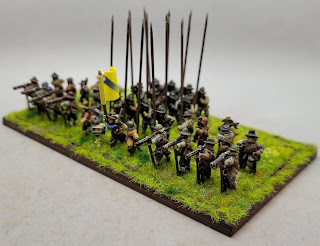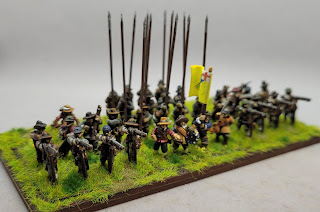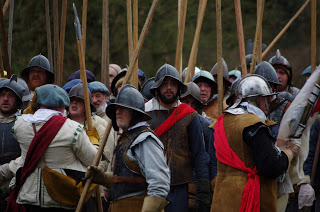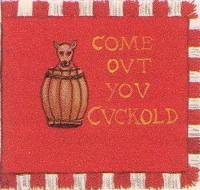The City of London Yellow Auxiliary Regiment of Foot
My final* unit of figures to paint. The 'to do' pile is empty.
So here they are the City of London Yellow Auxiliary Regiment of Foot of the London Trained Bands. A strange choice I hear you say... I selected them purely because their flag is a bit different to any of my other regiments. That really is the reason I have represented them.
The City of London Yellow Auxiliary Regiment of Foot of the London Trained Bands (a bit of a mouthful, so from now on 'City Yellow Auxiliaries') were raised on the 12th of April 1643 during the reorganisation and expansion of the London Trained Bands (henceforth LTB) in the Farringdon Within, Castle Baynard, and Aldersgate areas of the City (in other words the same areas as the Yellow Regiment).
If you are new to the Trained Bands, and the Auxiliaries in particular see my earlier posts:
Their history is somewhat confusing: much seems to stem from which auxiliary regiment is which. It was the convention in seventeenth century England to assign a colour description to a regiment, that colour being taken from their flag. This would appear to be the source of the confusion: The City of London Yellow Auxiliaries (these chaps), the Tower Hamlets Auxiliaries and the Westminster Auxiliaries all carried yellow flags, and are all described as 'Yellow Auxiliaries'. Most authors clarify by adding Tower Hamlets, City of London or Westminster; some, unfortunately do not.Stuart Reid "All The King's Armies (Spellmount 2007) caused much of my confusion by stating that the Yellow Auxiliaries joined Waller's Southern Association, but he does not make it clear which Auxiliaries they were.
After further reading, contemplation, and several cups of tea, I have come to the conclusion that Reid would appear to be referring to the Yellow Auxiliaries of Tower Hamlets and not the City Yellow Auxiliaries:-
Laurence Spring writing in "Waller's Army... Southern Association" (Pike and Shot Society 2007) describes the Yellow Auxiliaries of Tower Hamlets as fighting with Waller's Southern Association at Basing House, Alton, and Second Newbury. Jessie Childs, "The Siege of Loyalty House" (The Bodley Head, 2022) confirms that the Tower Hamlets Yellow Auxiliaries are present at Basing House.
Keith Roberts, "London and Liberty" (Partizan Press 1987) describes the City Yellow Auxiliaries serving with the Earl of Essex in 1644: garrisoning Weymouth (thereby missing the debacle at Lostwithiel), then being sent to reinforce the garrison at Plymouth where it remained until 1646. However, Peachey and Turton "Old Robin's Foot" (Partizan Press, second edition 2017) make no mention of Yellow Auxiliaries (of any flavour) being part of Essex's Army.
The BCW Regimental Wiki, told a very different tale when I started my research. It now agrees with Roberts but also adds in skirmishes at Gosford Bridge and Enslow, in Oxfordshire. Essex's Army was originally tasked to join forces with Waller's Southern Association at Oxford; after initially venturing to Oxford, Essex made some very poor decisions (which allowed the King to escape from Oxford with his army), then decided to ignore his orders and divert to the West Country (much to Waller's and Parliament's disgust).
In October 1646 they, along with almost every other LTB Regiment, lined the funeral procession route for the Earl of Essex's funeral.
Now for a lie down after sorting all that out.
Rank and file are all PP, with a handful of headswaps to vary the musketeers a little. I've given them muskets with rests: partly for variety, but also because it is a little bit of a generalisation that musketeers ditched using rests as the Wars progressed. As these are Auxiliaries, in other words men who are too poor to join the Trained Bands, I have not given the pike any 'trained band buff' and gone for less flamboyant colours for the rank and file.
Command consists of figures from a number of manufacturers: one halberdier is an old Naismith sculpt (with big feather in his hat), the other is from Steel Fist (no feather). The command strip figures are from Steel Fist with the exception of the ensign who is from PP. Rank and file are all PP. As always bases, and custom casualty marker from Warbases; flag from Maverick Models.
Eagle eyed readers will be wondering what on earth is lurking in the undergrowth behind the Naismith halberdier. It is a cat (from Pendraken). So why is there a cat there? It is there in honour of my big cat who has constantly harried me whilst painting these figures, by continually tapping me on the bottom. He does this to politely request his fix of catnip spraying on his bed. So, yes I have a junkie cat and I, apparently, am his pusher.
And with that, the project box is now empty - apart from spare heads, drums, and weapons. Hopefully PP will produce a large number of 'characters' like they have for their ACW and WoTR ranges, then expect a flurry of activity.
* Regular readers (hello all eight of you) will have seen this comment before, and will, rightly so, take it with a pinch of salt.
If you enjoyed reading this, or any of the other posts, please consider supporting the blog.
Thanks.















Warm (and jealous) congratulations on achieving such a milestone. No pile of lead whatsoever!? Well done indeed.
ReplyDeleteThanks Dex
Delete